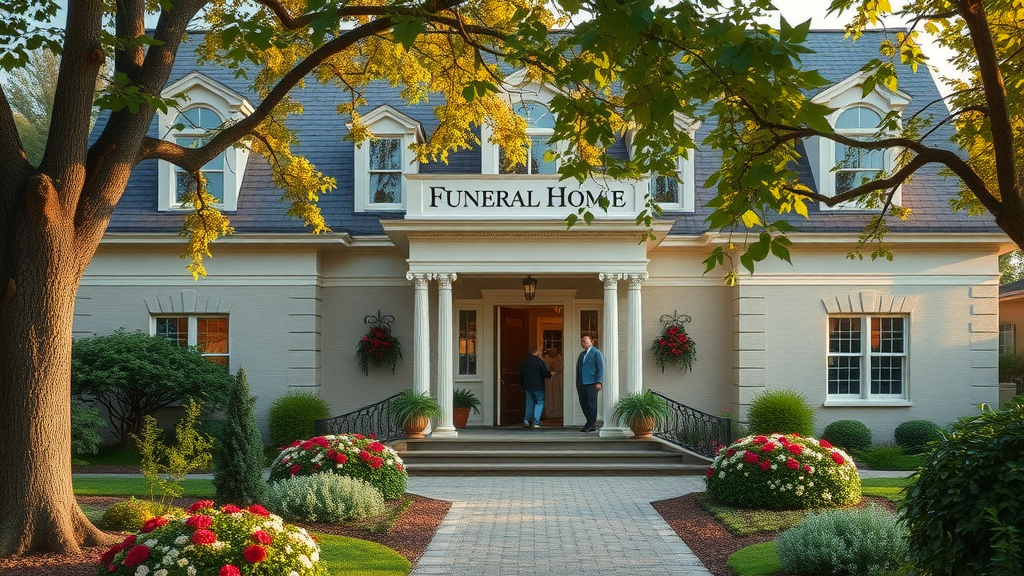Have you ever wondered, “What really sets a funeral home apart from a mortuary?” These terms are often used interchangeably, but understanding their true differences can help families make informed, confident choices during some of life's most sensitive moments. This guide unravels the distinct roles, services, and environments of funeral homes and mortuaries—giving you clarity when it matters most.
Unlocking the Mystery: Funeral Home vs Mortuary
When searching for answers to what is the difference between a funeral home and a mortuary?, it’s vital to understand that although both handle the care of a deceased loved one, their purposes and methodologies can be remarkably different. A funeral home is often seen as a place where families gather for memorial services, grief counseling, and to plan end-of-life celebrations, guided by compassionate funeral directors. Meanwhile, a mortuary offers a more clinical, functional approach, focusing primarily on the technical aspects of body preparation, especially for burial or cremation.
Families often face difficult choices during times of loss. By demystifying these terms and the services they provide, this article empowers you to choose the right provider for your circumstances. Whether your priority is honoring a family member with a personalized memorial or ensuring an efficient, modest handling of remains, understanding the key differences will allow you to connect with the right professionals and facilities.

What You’ll Learn
- The definition and role of a funeral home vs mortuary
- Key differences and similarities
- How funeral homes and mortuaries support body donation
- Expert insights from the funeral profession
- Answers to the most common questions about mortuaries and funeral homes
Defining the Terms: What is the Difference Between a Funeral Home and a Mortuary?
Funeral Home: Overview, Services, and History
A funeral home is typically a full-service facility designed to provide not only the preparation and dignified care of the deceased person but also to support families through the grieving process. Modern funeral homes are warm, welcoming spaces where family members can connect with supportive funeral directors, plan funeral services, and gather for memorial services. Funeral homes often offer a range of services that include embalming, body preparation, viewing rooms, chapels, and event spaces for personalized ceremonies. Some funeral homes even provide grief counseling, educational seminars, and assistance with pre-planning funeral or memorial arrangements.
The history of funeral homes dates back centuries, evolving from family-managed arrangements to established businesses staffed by licensed professionals in funeral planning and mortuary sciences. These professionals are trained to handle not only the technical aspects of body for burial or cremation, but also to connect with families on an emotional level. The modern funeral home is a business with a mission: to celebrate life’s passing with respect and dignity while supporting the emotional needs of surviving family members.

Mortuary: Overview, Functions, and Regulations
A mortuary is best understood as a facility primarily focused on the technical and clinical aspects of caring for the deceased person. Essentially, a mortuary offers the necessary services related to body preparation—most often embalming, sanitation, and preparation for direct burial or cremation. Mortuaries are usually attached to hospitals, medical facilities, or operate independently as specialized centers for body preservation, making them critical in cases involving medical examiner reviews, body donation, or when legal documentation is required.
Unlike funeral homes, mortuaries typically do not provide space for memorial or funeral services, nor do they offer extensive grief counseling or planning support. Instead, their focus is on the straightforward, efficient processing of remains, operating in accordance with regulatory and health standards. This means that mortuaries and funeral homes have different regulatory frameworks to ensure the dignity and safety of the deceased. Choosing a mortuary might be more suitable for families who prefer minimal services or direct cremation, often at a lower cost. The term mortuary is widely recognized within medical communities and is associated with the clinical handling of the deceased, as defined by mortuary science.

Key Difference Between Funeral Homes and Mortuaries
| Aspect | Funeral Home | Mortuary |
|---|---|---|
| Primary Purpose | Full range of funeral services, memorials, and emotional support | Technical body preparation for burial or cremation |
| Facilities | Chapel, viewing rooms, event spaces, family lounges | Preparation rooms, refrigerated storage, clinical setting |
| Staff | Licensed funeral directors, grief counselors, event coordinators | Embalmers, technical staff trained in mortuary sciences |
| Typical Services | Funeral planning, memorial services, grief counseling, body donation assistance | Body sanitation, embalming, documentation, direct cremation or burial |
| Atmosphere | Warm, comforting, community-focused | Clinical, functional, efficient |
| Cost Structure | Depends on the range of services, typically higher | Generally lower, service-based |
| Regulations | State/local regulations, requires licensed professionals and directors | Specific health and safety regulations, often within medical facilities |
Mortuaries and Funeral Homes: Similarities
- Both handle care and preparation of the deceased
- Provide support for families
- May assist with legal documentation
Despite their differences, mortuaries and funeral homes share crucial responsibilities when it comes to handling a deceased person with dignity and respect. First, both facilities must follow regulatory guidelines in body for burial or cremation, ensuring the process meets legal standards. Second, staff at both a funeral home or mortuary are often able to provide essential support with paperwork, such as death certificates and transport permits. Lastly, while the scope varies, some mortuaries and funeral homes can each offer advice and guidance for families, particularly when navigating difficult decisions like body donation or dealing with estate affairs, reflecting overlapping roles in community support and end-of-life care.
As you weigh the differences between funeral homes and mortuaries, you may also be considering the type of final arrangement that best fits your family's wishes. For a deeper look at the pros and cons of cremation versus traditional funerals, explore this comprehensive guide on choosing between cremation and funeral services to help inform your decision.
Key Difference: Service Scope, Atmosphere, and Specialized Offerings
The key difference between a funeral home and a mortuary lies in the services they provide, the ambiance, and their ability to meet specialized needs. Funeral homes offer a greater range of services, including personalized funeral and memorial experiences, grief counseling, and amenities such as event spaces for family gatherings. Families choosing a funeral home value not only the technical handling of their loved one but also emotional support, opportunities for remembrance, and the ability to commemorate a life well-lived.
In contrast, mortuaries typically cater to families seeking direct, efficient, and affordable solutions. The environment of a mortuary is more clinical, focusing on expedient and respectful care. Many mortuaries do not have facilities for gatherings or ceremonies but excel in technical preparation, especially when time or documentation is a priority. This key difference is important when deciding which provider fulfills the specific wishes of the deceased and their family members.

Funeral Home and Mortuary Services: What to Expect
Connect with Caring Professionals: Service Quality and Approach
Regardless of your choice, the opportunity to connect with compassionate professionals remains central. Funeral directors and staff at funeral homes are trained to provide a welcoming environment, supporting families through every aspect of funeral planning, memorial services, and even grief counseling. Their holistic approach goes beyond body preparation to ensure loved ones are honored, remembered, and that surviving family members feel comforted and supported. Funeral homes strive to make every detail of the farewell meaningful, from personalized tributes to aftercare resources, ensuring no aspect is overlooked.
Mortuary professionals, while less involved in the ceremonial aspects, also play a vital role in supporting families by delivering services with efficiency and dignity. Their expertise is rooted in mortuary science—focusing on technical accuracy, sanitation, and legal compliance. They are particularly skilled in handling sensitive circumstances such as anatomical donation, transport for medical research, or situations requiring minimal public ceremony. Some families find comfort in the straightforward, professional care that mortuaries offer, making them the right fit for specific needs.

Body Donation: Navigating End-of-Life Choices
Funeral homes and mortuaries play crucial roles for those considering body donation after death. Both types of facilities are equipped to assist with the necessary documentation, transportation, and preparation associated with donating a body to science or medical research. Funeral homes often guide families through the decision, explaining the process, options for memorialization after donation, and available support resources. They can act as a liaison between families and medical facilities, coordinating body donation with sensitivity and legal compliance.
Conversely, mortuaries, with their strong ties to hospitals and medical examiners, are frequently called upon for the technical aspects of body donation. Their staff are often versed in the requirements for donating bodies for scientific, educational, or research purposes, and manage important tasks like record-keeping and communication with universities or hospitals. Whether you opt for a funeral home or mortuary, the assistance they provide in managing body donation processes can ensure the wishes of the deceased are honored with dignity and care.
Choosing Between Funeral Homes and Mortuaries: What You Need to Know
- Assess the deceased's and family's wishes: Reflect on what is most meaningful for honoring your loved one—be it a personalized gathering or a simple, efficient farewell.
- Consider the scope of memorial and cultural needs: Some families require religious or cultural ceremonies that are best accommodated in a funeral home, while others may prefer the directness of a mortuary.
- Factor in location and pricing: Proximity to the family, available facilities, and service costs are crucial. Funeral homes generally charge more due to their broader range of services, while mortuaries can be more budget-friendly.
- Evaluate available facilities and amenities: Review what each provider offers—such as event spaces, private viewing rooms, or technical handling services—to ensure they match your needs.
Expert Perspectives: Insights on Mortuaries and Funeral Homes
"Choosing between a funeral home and a mortuary depends on the family's desired level of involvement and the type of service they hope to create." – Licensed Funeral Director
"Mortuaries typically handle the essential services with efficiency, while funeral homes often go beyond to foster community and healing." – Grief Counselor
People Also Ask About: What Is the Difference Between a Funeral Home and a Mortuary?
Are mortuary and funeral home the same thing?
No, mortuary and funeral home are not the same thing, though their roles frequently overlap. A funeral home usually encompasses a broader range of services, offering both the emotional and logistical aspects of end-of-life care—including planning, grief support, funeral services, and memorials. A mortuary, on the other hand, focuses mainly on the technical tasks like preparing a body for burial or cremation. Mortuaries and funeral homes both care for the deceased, but differ in their approach, atmosphere, and the extent of services they provide.
Do morticians have to live in the funeral home?
While some funeral directors or morticians once lived on-site to be on call at all hours, this is much less common today. Most modern funeral homes and mortuaries operate with staff who are available as needed but do not require round-the-clock residency. However, tradition and local regulations may still dictate living arrangements for funeral home or mortuary personnel in some areas—especially in smaller communities.
Do all funeral homes have a mortuary?
Not all funeral homes have dedicated mortuary facilities, although many are equipped for on-site embalming and preparation. Sometimes, funeral homes partner with independent mortuaries or use nearby hospital mortuary facilities for the technical preparation of remains. Families seeking both ceremony and technical services should confirm what their chosen provider offers and where each service is performed.
What happens to a body if no one can pay for a funeral?
If no one can afford funeral costs, state or local authorities typically oversee final disposition, often through indigent burial or direct cremation programs. In such cases, a mortuary or contracted funeral home may handle the technical arrangements, ensuring the deceased person receives dignity and proper care. Legal documentation and logistics—like death certificates and transportation—are usually coordinated by government or public health agencies in collaboration with mortuaries and funeral homes.
Frequently Asked Questions: What is the Difference Between a Funeral Home and a Mortuary?
- What are the primary services provided by each? Funeral homes offer comprehensive planning, ceremonies, and emotional support, while mortuaries provide efficient, clinical care and body preparation for burial or cremation.
- Are costs different between funeral homes and mortuaries? Yes. Funeral homes generally charge more due to the broad variety of services and amenities provided. Mortuaries focus on technical services and are often more cost-efficient.
- How to choose the right provider for your family? Assess your family’s wishes, required services, preferred atmosphere, and affordability. Tour available facilities and consult with licensed professionals to make an informed decision.
- Can either assist with pre-planning and body donation? Yes. Both can help with pre-planning and documentation for body donation, though funeral homes may offer more guidance and support throughout the process.
Key Takeaways: What is the Difference Between a Funeral Home and a Mortuary?
- Funeral homes offer more comprehensive services and emotional support
- Mortuaries focus on body preparation and essential arrangements
- Both serve vital community roles in end-of-life care
Conclusion: Making Informed Choices
By understanding what is the difference between a funeral home and a mortuary?, you can choose the provider best suited to honor your loved one’s wishes with dignity and respect.
Take the Next Step with Confidence
When the time comes, consider your family’s needs and connect with local funeral homes or mortuaries to ensure compassionate, professional care.
If you’re looking to plan ahead and ease the burden on your loved ones, taking the time to understand pre-burial planning can be invaluable. Discover what you should consider before starting a pre burial plan, including essential steps and expert tips, by visiting our in-depth resource on pre-burial planning essentials. Proactive preparation not only brings peace of mind but also ensures your wishes are honored and your family is supported every step of the way. Explore advanced planning strategies to make confident, informed decisions for the future.
A short explainer video illustrates the main differences, helping visual learners understand the distinct roles and services offered by funeral homes and mortuaries.
When exploring the distinctions between a funeral home and a mortuary, it’s essential to understand their unique roles and services. A funeral home is a full-service facility that not only prepares the deceased for burial or cremation but also offers comprehensive support to the bereaved family. This includes organizing memorial services, providing grief counseling, and assisting with funeral planning. The environment is typically designed to be warm and comforting, aiming to support families through their grieving process. (en.wikipedia.org)
In contrast, a mortuary primarily focuses on the technical aspects of body preparation, such as embalming and sanitation, often operating within hospitals or medical facilities. Mortuaries may not provide spaces for memorial services or extensive emotional support, emphasizing efficiency and the clinical handling of the deceased. (en.wikipedia.org)
Understanding these differences can help families make informed decisions that align with their needs and preferences during difficult times.
 Add Row
Add Row 

 Add
Add 


Write A Comment